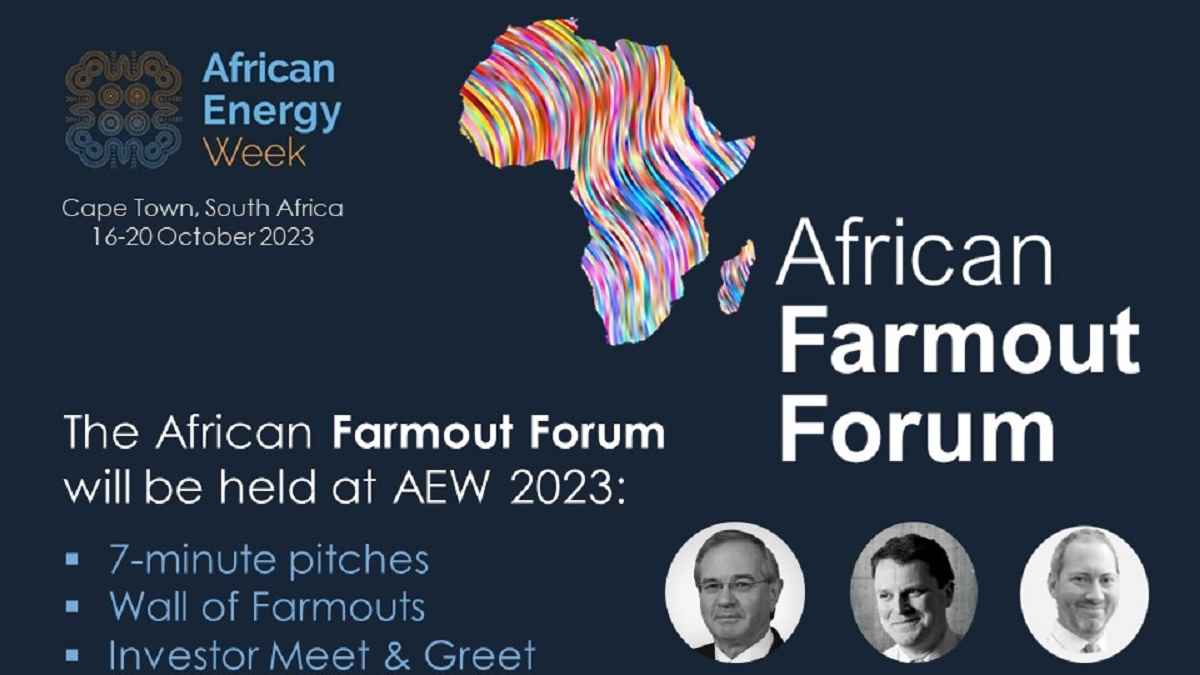Featuring in-depth presentations, engaging Q&A sessions and private meetings, the African Farmout Forum will connect companies with oil blocks, permits and licenses, enabling both major and independent E&P firms to invest in Africa
JOHANNESBURG, South Africa, August 15, 2023/APO Group/ —
The African Energy Chamber (AEC) (http://www.EnergyChamber.org) is proud to announce that financial services company Moyes & Co; global acquisition and divestment advisor Envoi; and oil and gas deal listing platform FarmoutAngel have teamed up with Africa’s biggest energy event African Energy Week (AEW) 2023 to launch the African Farmout Forum: a platform created to advancing deals across the continent’s upstream sector. The forum will take place during this year’s AEW conference – scheduled for October 16-20 in Cape Town – and will feature a slate of 7-minute pitches; a wall of farmouts; and an investor meet & greet. Taking place concurrently with an African Export-Import Bank-led deal room, the forum represents the official upstream deal-signing place for Africa.
The African Farmout Forum will introduce companies, investors and publicly-traded firms to oil blocks, licenses and/or permits through an interactive platform led by industry experts. Notably, Moyes & Co is a professional team with worldwide practical operational and technical experience in the natural resources industry. The firm provides transaction management; fair market and corporate asset valuations; new ventures and deal scoping; and many other services. Envoi, on the other hand, specializes in acquisition and divestment, portfolio advice and project marketing for the international upstream industry while FarmoutAngel offers a suite of data and analytics regarding oil and gas deals and asset valuations and considerations.
All three companies have played an instrumental role in facilitating Merger & Acquisition (M&A) activity in Africa, driving deal-making while marketing some of the continent’s most prolific hydrocarbon prospects. The African Farmout Forum – organized and delivered by the three companies – will build on this expertise to pave the way for International Oil Companies (IOC) to do deals in Africa at AEW 2023. Live presentations will be featured while collaborative Q&A sessions aim to expand the understanding of Africa’s oil and gas acreage. One-on-one meeting opportunities are also available. For small and independent companies seeking liquidity, and larger players looking for a balance of individual and institutional investment, the forum engages a suite of investors from across the globe. Interested in presenting your deal? Contact deliver@envoi.co.uk.
Emerging markets such as Sierra Leone, Uganda, Kenya and many others have either launched or are preparing to open licensing rounds in an effort to bolster exploration
In 2023, Africa’s upstream sector has already been a buzz of activity. In the first half of the year, the continent’s M&A transactions reached just short of $2 billion, with the total estimated recoverable resources equating to 320 million barrels of oil equivalent. Both major and emerging oil-producing nations in Africa are ramping up exploration efforts in a bid to increase production continent-wide. National objectives to achieve universal access to electricity all while stimulating industrialization and economic growth call for a sharp increase in upstream oil and gas investment. New discoveries such as those made in Namibia, Ivory Coast and Libya in recent years are poised to unlock fresh acreage while opportunities across marginal fields and accelerated IOC divestment trigger newfound M&A prospects for private players. On the back of attractive fiscal policy, many African countries are inviting both major and independent explorers to invest in these basins, and are turning to bid licensing rounds to incentivize exploration. The AEC’s Q1 2023 Outlook, The State of African Energy, states that by the end of this year, up to 18 exploration licensing rounds are expected to be awarded while several new rounds undergo preparations. The AEW 2023 African Farmout Forum will play an instrumental part in facilitating these rounds.
In mature markets, new licensing rounds aim to maintain and even increase production levels. Natural declines in legacy fields threaten national output, and as demand continues to rise owing to population growth, urbanization and development, energy security will largely hinge on accelerated exploration. Representing part of the country’s six-year licensing round launched in 2019, Angola’s national concessionaire the National Oil, Gas and Biofuels Agency plans to open the next bid round in September 2023, with 12 onshore blocks on offer, including four in the Congo Basin and eight in the Kwanza Basin. Nigeria’s seven-block deep offshore mini-round and Equatorial Guinea’s EG Ronda 2023 are also underway while Ghana plans to open a new licensing round this year.
Meanwhile, burgeoning energy markets to the likes of Sierra Leone, Uganda, the Democratic Republic of Congo (DRC), Guinea-Bissau and Kenya are also focusing on licensing rounds, paving the way for new investment in untapped acreage. Earlier this year, the DRC launched a 30-block licensing round, comprising 27 oil blocks and three gas blocks. Currently, only the three gas blocks have been awarded. Sierra Leone’s sixth licensing round is underway and is set to close in September 2023 while Guinea-Bissau’s special deepwater tender round has five blocks open for bidding. In East Africa, Kenya and Uganda are preparing to launch licensing rounds, opening lucrative opportunities for frontier players.
“Eager to maintain production levels and open up new acreage in marginal fields, major producing nations such as Angola, Equatorial Guinea, Nigeria and more are inviting E&P players to invest and develop oil and gas blocks. At the same time, emerging markets such as Sierra Leone, Uganda, Kenya and many others have either launched or are preparing to open licensing rounds in an effort to bolster exploration in untapped basins. All of these present lucrative opportunities for both major and independent oil companies,” states NJ Ayuk, Executive Chairman of the AEC.
Distributed by APO Group on behalf of African Energy Chamber.
